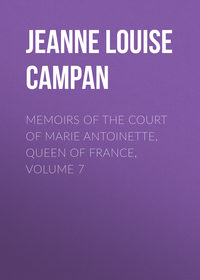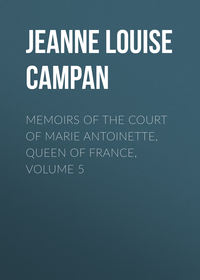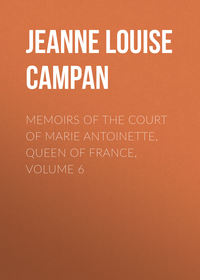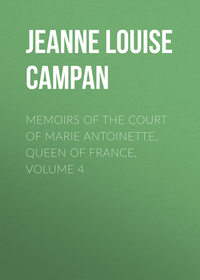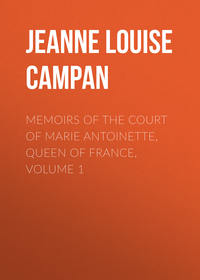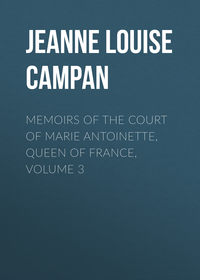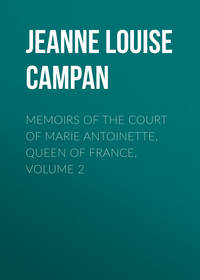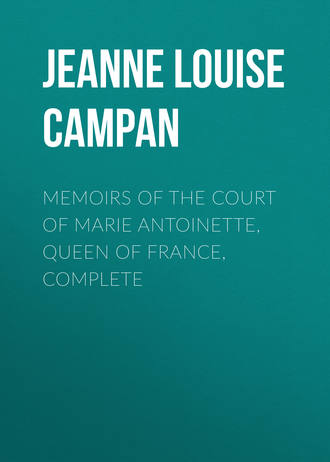 полная версия
полная версияMemoirs of the Court of Marie Antoinette, Queen of France, Complete
[No doubt it was in order to have the ancient seals ready at a moment’s notice, in case of a counter-revolution, that the Queen desired me not to quit the Tuileries. M. Gougenot threw the seals into the river, one from above the Pont Neuf, and the other from near the Pont Royal.—MADAME CAMPAN.]
At this moment we heard a great noise; he agreed to tie up the portfolio, take it again under his cloak, and go to a safe place to execute what I had taken upon me to determine. He made me swear, by all I held most sacred, that I would affirm, under every possible emergency, that the course I was pursuing had not been dictated to me by anybody; and that, whatever might be the result, I would take all the credit or all the blame upon myself. I lifted up my hand and took the oath he required; he went out. Half an hour afterwards a great number of armed men came to my house; they placed sentinels at all the outlets; they broke open secretaires and closets of which they had not the keys; they ‘searched the flower-pots and boxes; they examined the cellars; and the commandant repeatedly said, “Look particularly for papers.” In the afternoon M. Gougenot returned. He had still the seals of France about him, and he brought me a statement of all that he had burnt.
The portfolio contained twenty letters from Monsieur, eighteen or nineteen from the Comte d’Artois, seventeen from Madame Adelaide, eighteen from Madame Victoire, a great many letters from Comte Alexandre de Lameth, and many from M. de Malesherbes, with documents annexed to them. There were also some from M. de Montmorin and other ex-ministers or ambassadors. Each correspondence had its title written in the King’s own hand upon the blank paper which contained it. The most voluminous was that from Mirabeau. It was tied up with a scheme for an escape, which he thought necessary. M. Gougenot, who had skimmed over these letters with more attention than the rest, told me they were of so interesting a nature that the King had no doubt kept them as documents exceedingly valuable for a history of his reign, and that the correspondence with the Princes, which was entirely relative to what was going forward abroad, in concert with the King, would have been fatal to him if it had been seized. After he had finished he placed in my hands the proces-verbal, signed by all the ministers, to which the King attached so much importance, because he had given his opinion against the declaration of war; a copy of the letter written by the King to the Princes, his brothers, inviting them to return to France; an account of the diamonds which the Queen had sent to Brussels (these two documents were in my handwriting); and a receipt for four hundred thousand francs, under the hand of a celebrated banker. This sum was part of the eight hundred thousand francs which the Queen had gradually saved during her reign, out of her pension of three hundred thousand francs per annum, and out of the one hundred thousand francs given by way of present on the birth of the Dauphin.
This receipt, written on a very small piece of paper, was in the cover of an almanac. I agreed with M. Gougenot, who was obliged by his office to reside in Paris, that he should retain the proces-verbal of the Council and the receipt for the four hundred thousand francs, and that we should wait either for orders or for the means of transmitting these documents to the King or Queen; and I set out for Versailles.
The strictness of the precautions taken to guard the illustrious prisoners was daily increased. The idea that I could not inform the King of the course I had adopted of burning his papers, and the fear that I should not be able to transmit to him that which he had pointed out as necessary, tormented me to such a degree that it is wonderful my health endured the strain.
The dreadful trial drew near. Official advocates were granted to the King; the heroic virtue of M. de Malesherbes induced him to brave the most imminent dangers, either to save his master or to perish with him. I hoped also to be able to find some means of informing his Majesty of what I had thought it right to do. I sent a man, on whom I could rely, to Paris, to request M. Gougenot to come to me at Versailles he came immediately. We agreed that he should see M. de Malesherbes without availing himself of any intermediate person for that purpose.
M. Gougenot awaited his return from the Temple at the door of his hotel, and made a sign that he wished to speak to him. A moment afterwards a servant came to introduce him into the magistrates’ room. He imparted to M. de Malesherbes what I had thought it right to do with respect to the King’s papers, and placed in his hands the proces-verbal of the Council, which his Majesty had preserved in order to serve, if occasion required it, for a ground of his defence. However, that paper is not mentioned in either of the speeches of his advocate; probably it was determined not to make use of it.
I stop at that terrible period which is marked by the assassination of a King whose virtues are well known; but I cannot refrain from relating what he deigned to say in my favour to M. de Malesherbes:
“Let Madame Campan know that she did what I should myself have ordered her to do; I thank her for it; she is one of those whom I regret I have it not in my power to recompense for their fidelity to my person, and for their good services.” I did not hear of this until the morning after he had suffered, and I think I should have sunk under my despair if this honourable testimony had not given me some consolation.
SUPPLEMENT TO CHAPTER IX
MADAME CAMPAN’S narrative breaking off abruptly at the time of the painful end met with by her sister, we have supplemented it by abridged accounts of the chief incidents in the tragedy which overwhelmed the royal house she so faithfully served, taken from contemporary records and the best historical authorities.
The Royal Family in the TempleThe Assembly having, at the instance of the Commune of Paris, decreed that the royal family should be immured in the Temple, they were removed thither from the Feuillans on the 13th of August, 1792, in the charge of Potion, Mayor of Paris, and Santerre, the commandant-general. Twelve Commissioners of the general council were to keep constant watch at the Temple, which had been fortified by earthworks and garrisoned by detachments of the National Guard, no person being allowed to enter without permission from the municipality.
The Temple, formerly the headquarters of the Knights Templars in Paris, consisted of two buildings,—the Palace, facing the Rue de Temple, usually occupied by one of the Princes of the blood; and the Tower, standing behind the Palace.
[Clery gives a more minute description of this singular building: “The small tower of the Temple in which the King was then confined stood with its back against the great tower, without any interior communication, and formed a long square, flanked by two turrets. In one of these turrets there was a narrow staircase that led from the first floor to a gallery on the platform; in the other were small rooms, answering to each story of the tower. The body of the building was four stories high. The first consisted of an antechamber, a dining-room, and a small room in the turret, where there was a library containing from twelve to fifteen hundred volumes. The second story was divided nearly in the same manner. The largest room was the Queen’s bedchamber, in which the Dauphin also slept; the second, which was separated from the Queen’s by a small antechamber almost without light, was occupied by Madame Royale and Madame Elisabeth. The King’s apartments were on the third story. He slept in the great room, and made a study of the turret closet. There was a kitchen separated from the King’s chamber by a small dark room, which had been successively occupied by M. de Chamilly and M. de Hue. The fourth story was shut up; and on the ground floor there were kitchens of which no use was made.” —“Journal,” p. 96.]
The Tower was a square building, with a round tower at each corner and a small turret on one side, usually called the Tourelle. In the narrative of the Duchesse d’Angouleme she says that the soldiers who escorted the royal prisoners wished to take the King alone to the Tower, and his family to the Palace of the Temple, but that on the way Manuel received an order to imprison them all in the Tower, where so little provision had been made for their reception that Madame Elisabeth slept in the kitchen. The royal family were accompanied by the Princesse de Lamballe, Madame de Tourzel and her daughter Pauline, Mesdames de Navarre, de Saint-Brice, Thibaut, and Bazire, MM. de Hug and de Chamilly, and three men-servants—An order from the Commune soon removed these devoted attendants, and M. de Hue alone was permitted to return. “We all passed the day together,” says Madame Royale. “My father taught my brother geography; my mother history, and to learn verses by heart; and my aunt gave him lessons in arithmetic. My father fortunately found a library which amused him, and my mother worked tapestry . . . . We went every day to walk in the garden, for the sake of my brother’s health, though the King was always insulted by the guard. On the Feast of Saint Louis ‘Ca Ira’ was sung under the walls of the Temple. Manuel that evening brought my aunt a letter from her aunts at Rome. It was the last the family received from without. My father was no longer called King. He was treated with no kind of respect; the officers always sat in his presence and never took off their hats. They deprived him of his sword and searched his pockets . . . . Petion sent as gaoler the horrible man—[Rocher, a saddler by trade] who had broken open my father’s door on the 20th June, 1792, and who had been near assassinating him. This man never left the Tower, and was indefatigable in endeavouring to torment him. One time he would sing the ‘Caramgnole,’ and a thousand other horrors, before us; again, knowing that my mother disliked the smoke of tobacco, he would puff it in her face, as well as in that of my father, as they happened to pass him. He took care always to be in bed before we went to supper, because he knew that we must pass through his room. My father suffered it all with gentleness, forgiving the man from the bottom of his heart. My mother bore it with a dignity that frequently repressed his insolence.” The only occasion, Madame Royale adds, on which the Queen showed any impatience at the conduct of the officials, was when a municipal officer woke the Dauphin suddenly in the night to make certain that he was safe, as though the sight of the peacefully sleeping child would not have been in itself the best assurance.
Clery, the valet de chambre of the Dauphin, having with difficulty obtained permission to resume his duties, entered the Temple on the 24th August, and for eight days shared with M. de Hue the personal attendance; but on the 2d September De Hue was arrested, seals were placed on the little room he had occupied, and Clery passed the night in that of the King. On the following morning Manuel arrived, charged by the Commune to inform the King that De Hue would not be permitted to return, and to offer to send another person. “I thank you,” answered the King. “I will manage with the valet de chambre of my son; and if the Council refuse I will serve myself. I am determined to do it.” On the 3d September Manual visited the Temple and assured the King that Madame de Lamballe and all the other prisoners who had been removed to La Force were well, and safely guarded. “But at three o’clock,” says Madame Royale, “just after dinner, and as the King was sitting down to ‘tric trac’ with my mother (which he played for the purpose of having an opportunity of saying a few words to her unheard by the keepers), the most horrid shouts were heard. The officer who happened to be on guard in the room behaved well. He shut the door and the window, and even drew the curtains to prevent their seeing anything; but outside the workmen and the gaoler Rocher joined the assassins and increased the tumult. Several officers of the guard and the municipality now arrived, and on my father’s asking what was the matter, a young officer replied, ‘Well, since you will know, it is the head of Madame de Lamballe that they want to show you.’ At these words my mother was overcome with horror; it was the only occasion on which her firmness abandoned her. The municipal officers were very angry with the young man; but the King, with his usual goodness, excused him, saying that it was his own fault, since he had questioned the officer. The noise lasted till five o’clock. We learned that the people had wished to force the door, and that the municipal officers had been enabled to prevent it only by putting a tricoloured scarf across it, and allowing six of the murderers to march round our prison with the head of the Princess, leaving at the door her body, which they would have dragged in also.”
Clery was not so fortunate as to escape the frightful spectacle. He had gone down to dine with Tison and his wife, employed as servants in the Temple, and says: “We were hardly seated when a head, on the end of a pike, was presented at the window. Tison’s wife gave a great cry; the assassins fancied they recognised the Queen’s voice, and responded by savage laughter. Under the idea that his Majesty was still at table, they placed their dreadful trophy where it must be seen. It was the head of the Princesse de Lamballe; although bleeding, it was not disfigured, and her light hair, still in curls, hung about the pike.”
At length the immense mob that surrounded the Temple gradually withdrew, “to follow the head of the Princess de Lamballe to the Palais Royal.”
[The pike that bore the head was fixed before the Duc d’Orleans’s window as he was going to dinner. It is said that he looked at this horrid sight without horror, went into the dining-room, sat down to table, and helped his guests without saying a word. His silence and coolness left it doubtful whether the assassins, in presenting him this bloody trophy, intended to offer him an insult or to pay him homage.—DE MOLLEVILLE’S “Annals of the French Revolution,” vol. vii., p. 398.]
Meanwhile the royal family could scarcely believe that for the time their lives were saved. “My aunt and I heard the drums beating to arms all night,” says Madame Royale; “my unhappy mother did not even attempt to sleep. We heard her sobs.”
In the comparative tranquillity which followed the September massacres, the royal family resumed the regular habits they had adopted on entering the Temple. “The King usually rose at six in the morning,” says Clery. “He shaved himself, and I dressed his hair; he then went to his reading-room, which, being very small, the municipal officer on duty remained in the bedchamber with the door open, that he might always keep the King in sight. His Majesty continued praying on his knees for some time, and then read till nine. During that interval, after putting his chamber to rights and preparing the breakfast, I went down to the Queen, who never opened her door till I arrived, in order to prevent the municipal officer from going into her apartment. At nine o’clock the Queen, the children, and Madame Elisabeth went up to the King’s chamber to breakfast. At ten the King and his family went down to the Queen’s chamber, and there passed the day. He employed himself in educating his son, made him recite passages from Corneille and Racine, gave him lessons in geography, and exercised him in colouring the maps. The Queen, on her part, was employed in the education of her daughter, and these different lessons lasted till eleven o’clock. The remaining time till noon was passed in needlework, knitting, or making tapestry. At one o’clock, when the weather was fine, the royal family were conducted to the garden by four municipal officers and the commander of a legion of the National Guard. As there were a number of workmen in the Temple employed in pulling down houses and building new walls, they only allowed a part of the chestnut-tree walk for the promenade, in which I was allowed to share, and where I also played with the young Prince at ball, quoits, or races. At two we returned to the Tower, where I served the dinner, at which time Santerre regularly came to the Temple, attended by two aides-de-camp. The King sometimes spoke to him,—the Queen never.
“After the meal the royal family came down into the Queen’s room, and their Majesties generally played a game of piquet or tric-trac. At four o’clock the King took a little repose, the Princesses round him, each with a book . . . . When the King woke the conversation was resumed, and I gave writing lessons to his son, taking the copies, according to his instructions, from the works of, Montesquieu and other celebrated authors. After the lesson I took the young Prince into Madame Elisabeth’s room, where we played at ball, and battledore and shuttlecock. In the evening the family sat round a table, while the Queen read to them from books of history, or other works proper to instruct and amuse the children. Madame Elisabeth took the book in her turn, and in this manner they read till eight o’clock. After that I served the supper of the young Prince, in which the royal family shared, and the King amused the children with charades out of a collection of French papers which he found in the library. After the Dauphin had supped, I undressed him, and the Queen heard him say his prayers. At nine the King went to supper, and afterwards went for a moment to the Queen’s chamber, shook hands with her and his sister for the night, kissed his children, and then retired to the turret-room, where he sat reading till midnight. The Queen and the Princesses locked themselves in, and one of the municipal officers remained in the little room which parted their chamber, where he passed the night; the other followed his Majesty. In this manner was the time passed as long as the King remained in the small tower.”
But even these harmless pursuits were too often made the means of further insulting and thwarting the unfortunate family. Commissary Le Clerc interrupted the Prince’s writing lessons, proposing to substitute Republican works for those from which the King selected his copies. A smith, who was present when the Queen was reading the history of France to her children, denounced her to the Commune for choosing the period when the Connstable de Bourbon took arms against France, and said she wished to inspire her son with unpatriotic feelings; a municipal officer asserted that the multiplication table the Prince was studying would afford a means of “speaking in cipher,” so arithmetic had to be abandoned. Much the same occurred even with the needlework, the Queen and Princess finished some chairbacks, which they wished to send to the Duchesse de Tarente; but the officials considered that the patterns were hieroglyphics, intended for carrying on a correspondence, and ordered that none of the Princesses work should leave the Temple. The short daily walk in the garden was also embittered by the rude behaviour of the military and municipal gaolers; sometimes, however, it afforded an opportunity for marks of sympathy to be shown. People would station themselves at the windows of houses overlooking the Temple gardens, and evince by gestures their loyal affection, and some of the sentinels showed, even by tears, that their duty was painful to them.
On the 21st September the National Convention was constituted, Petion being made president and Collot d’Herbois moving the “abolition of royalty” amidst transports of applause. That afternoon a municipal officer attended by gendarmes a cheval, and followed by a crowd of people, arrived at the Temple, and, after a flourish of trumpets, proclaimed the establishment of the French Republic. The man, says Clery, “had the voice of a Stentor.” The royal family could distinctly hear the announcement of the King’s deposition. “Hebert, so well known under the title of Pere Duchesne, and Destournelles were on guard. They were sitting near the door, and turned to the King with meaning smiles. He had a book in his hand, and went on reading without changing countenance. The Queen showed the same firmness. The proclamation finished, the trumpets sounded afresh. I went to the window; the people took me for Louis XVI. and I was overwhelmed with insults.”
After the new decree the prisoners were treated with increased harshness. Pens, paper, ink, and pencils were taken from them. The King and Madame Elisabeth gave up all, but the Queen and her daughter each concealed a pencil. “In the beginning of October,” says Madame Royale, “after my father had supped, he was told to stop, that he was not to return to his former apartments, and that he was to be separated from his family. At this dreadful sentence the Queen lost her usual courage. We parted from him with abundance of tears, though we expected to see him again in the morning.
[At nine o’clock, says Clery, the King asked to be taken to his family, but the municipal officers replied that they had “no orders for that.” Shortly afterwards a boy brought the King some bread and a decanter of lemonade for his breakfast. The King gave half the bread to Clery, saying, “It seems they have forgotten your breakfast; take this, the rest is enough for me.” Clery refused, but the King insisted. “I could not contain my tears,” he adds; “the King perceived them, and his own fell also.”]
They brought in our breakfast separately from his, however. My mother would take nothing. The officers, alarmed at her silent and concentrated sorrow, allowed us to see the King, but at meal-times only, and on condition that we should not speak low, nor in any foreign language, but loud and in ‘good French.’ We went down, therefore, with the greatest joy to dine with my father. In the evening, when my brother was in bed, my mother and my aunt alternately sat with him or went with me to sup with my father. In the morning, after breakfast, we remained in the King’s apartments while Clery dressed our hair, as he was no longer allowed to come to my mother’s room, and this arrangement gave us the pleasure of spending a few moments more with my father.”
[When the first deputation from the Council of the Commune visited the Temple, and formally inquired whether the King had any complaint to make, he replied, “No; while he was permitted to remain with his family he was happy.”]
The royal prisoners had no comfort except their affection for each other. At that time even common necessaries were denied them. Their small stock of linen had been lent them; by persons of the Court during the time they spent at the Feuillans. The Princesses mended their clothes every day, and after the King had gone to bed Madame Elisabeth mended his. “With much trouble,” says Clrry, “I procured some fresh linen for them. But the workwomen having marked it with crowned letters, the Princesses were ordered to pick them out.” The room in the great tower to which the King had been removed contained only one bed, and no other article of furniture. A chair was brought on which Clery spent the first night; painters were still at work on the room, and the smell of the paint, he says, was almost unbearable. This room was afterwards furnished by collecting from various parts of the Temple a chest of drawers, a small bureau, a few odd chairs, a chimney-glass, and a bed hung with green damask, which had been used by the captain of the guard to the Comte d’Artois. A room for the Queen was being prepared over that of the King, and she implored the workmen to finish it quickly, but it was not ready for her occupation for some time, and when she was allowed to remove to it the Dauphin was taken from her and placed with his father. When their Majesties met again in the great Tower, says Clery, there was little change in the hours fixed for meals, reading, walking and the education of their children. They were not allowed to have mass said in the Temple, and therefore commissioned Clery to get them the breviary in use in the diocese of Paris. Among the books read by the King while in the Tower were Hume’s “History of England” (in the original), Tasso, and the “De Imitatione Christi.” The jealous suspicions of the municipal officers led to the most absurd investigations; a draught-board was taken to pieces lest the squares should hide treasonable papers; macaroons were broken in half to see that they did not contain letters; peaches were cut open and the stones cracked; and Clery was compelled to drink the essence of soap prepared for shaving the King, under the pretence that it might contain poison.


